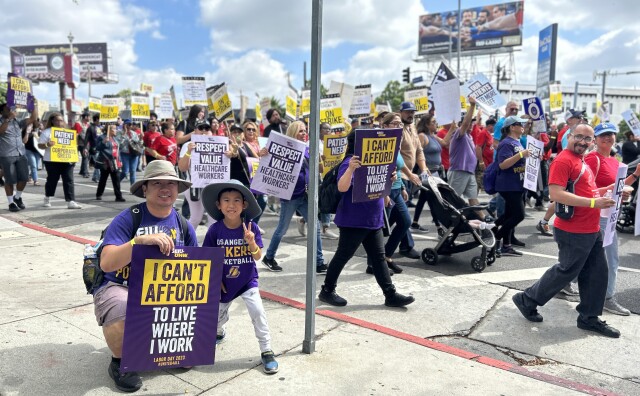What Did Porter Ranch Residents Breathe During The Massive Gas Leak? Here's What One Doctor's Quest Revealed

In the four years since a gas well ruptured at the Aliso Canyon underground gas storage field near Porter Ranch, residents have wanted to know if the chemicals that came out of the well for months made them sick.
They complain that they can't get straight answers from the L.A. County Department of Public Health or the gas field owner, Southern California Gas Company.
A local doctor, Jeffrey Nordella, has made it his business to try and find out. This week he shared his findings with more than 200 people at a town hall style meeting in Chatsworth.
WHO IS THIS DOCTOR?
When the blowout started in October 2015, Nordella was working as the director of a local family and urgent care medical office.
He noticed that long after the leak ended, his patients continued to report symptoms like headaches, nausea, stomach aches, dizziness and breathing problems.
However, at the same time, officials with the health department and SoCal Gas were saying the chemical releases had not exceeded health guidelines.
Nordella questioned that and started doing his own independent research.
He obtained anonymized complete blood count data from a blood testing company for 12,000 samples taken from adults between 2008 and 2018.
Of those, 4,500 hundred were from people living in the Porter Ranch zip code. The rest were control samples from places far away and unaffected by the leak - Malibu, Lancaster and Camarillo.
He analyzed the blood to see if there were any differences, and presented the results at the meeting.
"The goal of this town hall was to disclose to you everything that I know, because I believe in full transparency," Nordella told the crowd.
WHAT DID HE FIND?
The Porter Ranch blood samples showed statistically significant lower counts for red and white blood cells and for platelets, he said. The samples also had higher lymphocytes.
Nordella said those changes represent bone marrow suppression, which could potentially lead to diseases like anemia, leukemias.
He noted those conditions are associated with chronic benzene exposure. Benzene is found in crude oil and can cause cancer; the World Health Organization says there is no safe level of benzene.
The benzene could have come from the droplets of crude oil that blew out of the well while the leak was active. Those droplets landed on homes, cars, playground equipment and patio furniture.

WHAT IS THE COUNTY'S RESPONSE ?
The Public Health Department's Chief Scientist, Dr. Paul Simon, attended the town hall meeting on Saturday and called Nordella's work "a potentially important inquiry."
He agreed that benzene has the potential, at even low levels, to suppress bone marrow. He said he wanted to more closely review Nordella's data and conclusions.
Simon said he wanted to find out, "more about the folks who actually did get the testing. Were they folks who were already ill?"
The county's acknowledgement that Nordella's research is "potentially important" is a big shift from its previous defensiveness and reluctance to address it.
Nordella also called out the health department and other regulators for underplaying and even covering up the risks of living near the gas storage plant.
"Instead of receiving proper, pure scientific due diligence, followed by full disclosure to you, the people, you have received concealment, deception and fraud," Nordella said.
He pointed to actions such as the department sending a letter to local doctors telling them not to do toxicological testing on people complaining of certain symptoms because it could return misleading results.
Dr. Simon said that letter was poorly worded, because it was too broad.
But while he rejected the idea the the health department shielded SoCal Gas, he admitted that the county did take a while to realize how serious the health consequences might be, causing a loss of public confidence.
"There was this unintended, unintended effect that's been very, very damaging and counterproductive and has resulted in a deterioration, really, in the level of trust in our department," Simon said. "And so we're certainly very sorry about that."
Simon said the county sued SoCal Gas and negotiated a settlement that will, in part, contribute $25 million for a study of the long-term health effects of the gas blowout.
Dr. Simon added he is going to try to work with Nordella to further understand the findings.
MORE ON ALISO CANYON
How the worst gas leak in US history forced Angelenos to rethink their energy supply
-
The project will rename most of the terminals and all of the gates with the goal of world-class signage that leans into psychology.
-
On campus, many students found USC's reversal to be puzzling.
-
The highly anticipated airport service likely won’t open until October 2025.
-
In her first public statements since controversy erupted over millions of unaccounted for tax dollars, Rhiannon Do says she’s no longer with the O.C. nonprofit Viet America Society. She also says she never had a leadership role. Public documents show otherwise.
-
After San Gabriel's city council rejected the proposal as "too narrow", one city councilmember argued the entire DEI commission, created in the aftermath of George Floyd's murder, had "run its course."
-
A medical industry challenge to a $25 minimum wage ordinance in one Southern California city suggests health workers statewide could face layoffs and reductions in hours and benefits under a state law set to begin phasing in in June. Some experts are skeptical, however, that it will have such effects.






